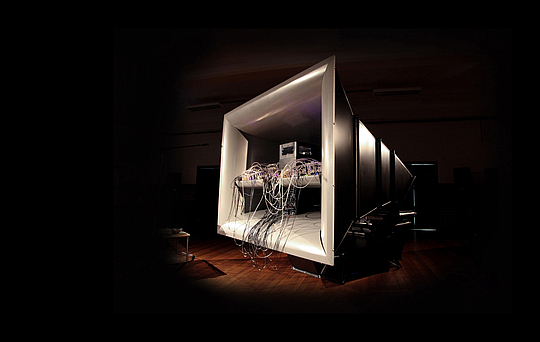Artificial Intelligence in Music
Focus Programme

CTM 2018’s Turmoil theme explores the state of music and sound practice in the face of a confusing and critical present. One angle of exploration into this theme is the array of discussion, from over-optimistic to ethically troubled, surrounding artificial intelligence.
As machine learning and AI become more intertwined in our daily lives and respond ever more accurately to human expectations, the positivist hope that they become indispensable collaborators in extending human potential is counterbalanced with fears of increased surveillance and autonomous weapons, worry about the socio-economical impact of automation, fearful projections of robot takeovers, and deep ethical questions around what it would mean to come face-to-face with a new form of consciousness.
Two indispensable contributors to this year’s focus on the cross-pollination of artificial intelligence and music, which is enabled through the support of the German Federal Cultural Foundation, are the American experimental music innovators George Lewis and Roscoe Mitchell. Both are long-term activists for the visibility of African-American composers, leaving their indelible marks through visionary work with ‘non-musical’ noise and computers. Lewis's interactive computer system, Voyager, which was one of the earliest strides in the development of a real-time relationship between a music-making machine intelligence and human musicians, enables improvisational, non-hierarchical communication between computer and artist. Lewis and Mitchell will perform with Voyager at CTM 2018.
Marcus Schmickler will be involved in two different AI-related projects. “Particle/Matter-Wave/Energy” explores the borders of a scientific universality of sonification towards something that becomes a singular experience – sound. Simultaneously, Schmickler also points to communication gaps between human and machine worlds; while machines can interpret complex algorithms at increasingly high resolutions, the realities that they create ultimately exceed the realm of human perception, comprehension, and/or enjoyment. In another project, Schmickler and Julian Rohrhuber explore the Mind Reader, an invention that helped lay the foundation for machine learning in the midst of the Cold War, and that also had a wide reception in psychoanalysis and media theory by way of Jacques Lacan.
Marco Donnarumma explores machine intelligence from the angle of the body. Wearing an AI robotic prosthesis that has a particular behaviour and sensibility towards its wearer, its environment, and surrounding sound, Donnarumma tests his and the AI’s agency through a ritualistic, sensual, and tense choreography of movement.
Oscillating between humour and unease, the music of Planet Mu signee Antwood investigates the crossroads of AI, internet, and consumerism. He produces delicate and uncanny cyber-ecosystems in reaction to subversive advertising, the ubiquity of ads, and the commodification of online content.
A night at Festsaal Kreuzberg will feature cherished club music trendsetters and technology theorists Holly Herndon & Mat Dryhurst in a special performance together with the Holly Herndon Ensemble vocal ensemble of Berlin-based musicians. The performance will explore themes of AI and frontiers (technological, geographical, and otherwise) while celebrating community and endorsing hope in the face of despondency. In keeping with the commending of alternative types of family and kin, the evening’s other performances will be given by members of the choir, many of whom have their own compelling solo projects.
AI is further explored by conceptual artist James Ferraro in a new stage performance as part of the collaborative CTM/transmediale concert at HKW. Including live visuals and scenographic elements by Nate Boyce, “Plague” is a choral work built around speculations on a future society in which an AI is simulating reality through the manipulation of living humans with the goal of creating the ultimate consumer product. As the AI struggles to emulate what it means to be human, tensions arise between the clinical gaze of the machine and the imperfection of its emulation. The piece is a joint commission with Abandon Normal Devices festival within their ongoing Creative Europe network The Networked Man.
More works problematizing AI will be presented at the CTM 2018 exhibition by Lawrence Lek and Guy Ben-Ary. Meanwhile, the 2018 Musicmakers Hacklab will offer artists and technologists opportunities for first-hand experience in working with AI-technology. Lectures and discussions within the festival’s daytime conference will complement the focus programme.
CTM 2018’s Artificial Intelligence focus is funded by the German Federal Cultural Foundation.


